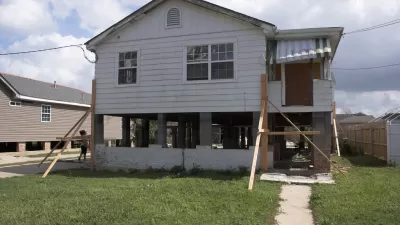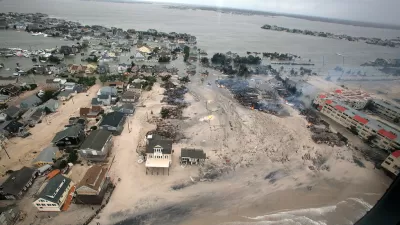In the wake of Superstorm Sandy, a new task force convened by New York's Mayor Michael R. Bloomberg and City Council speaker Christine C. Quinn will look into potential changes to the city's building code, with recommendations due next summer.
The Building Resiliency Task Force, to be chaired by Russell Unger, executive director of the Urban Green Council, is being charged with taking "an in-depth look at how to prepare city buildings for future storms and infrastructure failures." As Unger told reporter Mireya Navarro, "the new group would need to address both direct impacts from the storm, like structure collapse and flooding, and secondary ones, like power losses from utility failures."
"Some of the potential measures [to be considered] are relatively simple, like keeping sandbags handy and installing floodgates at building entrances. Others are more complicated, like relocating critical equipment like boilers above ground level or encasing them in watertight enclosures and rebuilding houses on concrete piles."
"What does not seem to be getting consideration, at least for now, is banning development altogether in the city’s flood zones, humble or affluent," says Navarro.
“'This is not a viable policy option in New York City, and to be honest, nor is it in any other major coastal city I’ve been working,' said Jeroen Aerts, a water risk expert from the Free University in Amsterdam who has been hired by the mayor’s office to assess flood protections. 'The stakes of developers and general economic activities in the waterfront are too high.'”
FULL STORY: After Storm, Dry Floors Prove Value of Exceeding City Code

Maui's Vacation Rental Debate Turns Ugly
Verbal attacks, misinformation campaigns and fistfights plague a high-stakes debate to convert thousands of vacation rentals into long-term housing.

Planetizen Federal Action Tracker
A weekly monitor of how Trump’s orders and actions are impacting planners and planning in America.

In Urban Planning, AI Prompting Could be the New Design Thinking
Creativity has long been key to great urban design. What if we see AI as our new creative partner?

King County Supportive Housing Program Offers Hope for Unhoused Residents
The county is taking a ‘Housing First’ approach that prioritizes getting people into housing, then offering wraparound supportive services.

Researchers Use AI to Get Clearer Picture of US Housing
Analysts are using artificial intelligence to supercharge their research by allowing them to comb through data faster. Though these AI tools can be error prone, they save time and housing researchers are optimistic about the future.

Making Shared Micromobility More Inclusive
Cities and shared mobility system operators can do more to include people with disabilities in planning and operations, per a new report.
Urban Design for Planners 1: Software Tools
This six-course series explores essential urban design concepts using open source software and equips planners with the tools they need to participate fully in the urban design process.
Planning for Universal Design
Learn the tools for implementing Universal Design in planning regulations.
planning NEXT
Appalachian Highlands Housing Partners
Mpact (founded as Rail~Volution)
City of Camden Redevelopment Agency
City of Astoria
City of Portland
City of Laramie




























